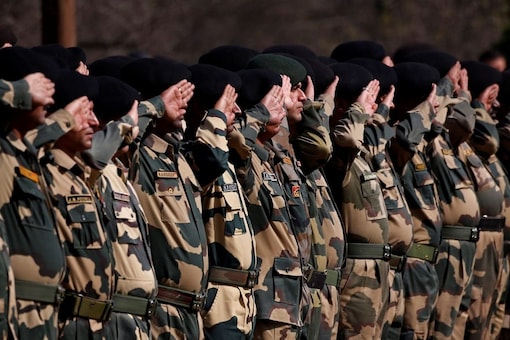NO FUNDAMENTAL RIGHTS FOR MILITARY/PARAMILITARY PERSONNEL
ARTICLE 33 OF CONSTITUTION OF INDIA

Introduction
The Indian Law does not treat its all citizens equal, nor does it grant them all rights. There is a class among its citizens who don’t have access to fundamental rights. And their rights are curtailed by the highest law of the country i.e. the constitution of India. Everyone who aspires to join and those who have joined fail to realize that they cease to have fundamental rights bestowed by The Constitution of India on them. Their rights are abridged and abrogated by the same constitution by enabling Govt to make a Law (Army Act/Navy Act/Airforce Act/Coast Guard Act/BSF Act etc) for maintaining discipline in the force.
Article 33
The article 33 of Constitution of India is produced here to understand “33. Power of Parliament to modify the rights conferred by this Part in their application to Forces, etc.-Parliament may, by law, determine to what extent any of the rights conferred by this Part shall, in their application to,-
(a) the members of the Armed Forces; or
(b) the members of the Forces charged with the maintenance of public order; or
(c) persons employed in any bureau or other organisation established by the State for purposes of intelligence or counter intelligence; or
(d) persons employed in, or in connection with, the telecommunication systems set up for the purposes of any Force, bureau or organisation referred to in clauses (a) to (c),
be restricted or abrogated so as to ensure the proper discharge of their duties and the maintenance of discipline among them.”
Detailed Understanding
Here vide this article, the constitution grants power to parliament to restrict or abrogate rights given by this part (Part III of Constitution which talks about Fundamental Rights) of persons defined from clause (a) to (d).
Therefore, personnel belonging to the Armed Forces of the Union that is Army, Navy, Airforce, Coast Guard including Central Armed Police Forces such as CRPF, BSF, ITBP, CISF etc or members of Forces responsible with public order such as state police do not have full Fundamental Rights as guaranteed by the constitution. Their rights have been diminished by the Acts made by parliament for their respective service.
Even the non-combatant personnel or civilians who stay in units or onboard ships such as Dhobi, Barbar, Civilian Bearer also dont have any such rights in full force. There for the six fundamental rights such as:
Right to Equality (in front of law, no discrimination, equal opportunity etc)
Right to Freedom (speech, to assemble, form associations and unions, etc)
Right against exploitation
Right to Freedom of religion
Cultural & education rights
Right to constitution remedies (Right to approach court if any right is harmed)
These rights and their parts are not applicable to the uniformed service personnel with full force. Nearly every time whenever a service personnel reaches court for any reason, the service always tries to hide behind this article 33 and tries to convey to the court that the service personnel’s rights have been curtailed the moment he signed to join the force. And courts are bound to follow the constitution of India.